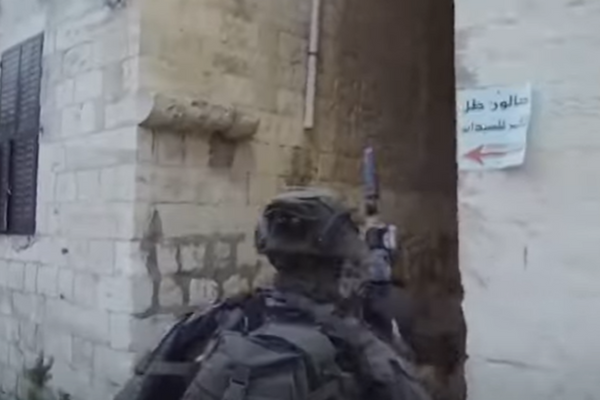A year after the IDF launched the massive counter-terror effort in Judea and Samaria, Israel is still grappling with a Palestinian terror wave, but many innocent lives have been saved, says IDF officer.
By Yaakov Lappin, JNS
A little over a year ago, on April 7, 2022, a Palestinian gunman who infiltrated Israel from Jenin shot and killed three Israeli civilians on Tel Aviv’s bustling Dizengoff Street, before being shot dead by police in Jaffa hours later. In an eerily similar terrorist atrocity committed on March 9, a Palestinian terrorist who infiltrated Israel from Nil’in in Judea and Samaria, commonly known as the West Bank, committed another atrocity on Tel Aviv’s Dizengoff Street, shooting and wounding three Israeli civilians, one critically.
Yet in between these two events was a rolling Israel Defense Forces security operation called “Operation Break the Wave,” which has made significant achievements in fighting terrorism in Judea and Samaria, but has not extinguished the wave of violence, as the latest attack demonstrates.
On March 12, IDF Chief of Staff Lt. Gen. Herzi Halevi and the Commanding Officer of IDF Central Command, Maj. Gen. Yehuda Fox, who is responsible for Judea and Samaria, spoke at an event honoring the forces participating in the ongoing operation.
“The IDF is carrying out ‘Operation Break the Wave with the assistance of a large and high-quality reserve force that works alongside active-duty forces. Fifty-six reserve battalions were summoned and arrived to carry out the terrorism-fighting mission,” said Halevi.
Maj. Nir Dinar, head of the IDF’s International Press Department, told JNS in recent days that the operation had a number of main focuses. The first, he said, is boosting the number of reinforcements and battalions operating in Judea and Samaria. The second is increasing the number of arrest operations, primarily in the Nablus and Jenin areas, where the Palestinian Authority has largely lost control.
For roughly six months prior to the outbreak of the terror wave last March, the IDF almost totally refrained from entering those areas, in an attempt to allow the P.A. to take control. The result, however, was a series of deadly attacks in Israeli cities, prompting the IDF to work tirelessly in Jenin and Nablus to track down, pursue and reach the terrorists.
“Our first duty is to our citizens. Security operations are occurring almost every day,” said Dinar.
In 2022, 33 Israelis lost their lives in terrorist attacks, while so far this year, after just three and a half months, the Israeli casualty number already stands at 14. Nevertheless, Dinar stressed, “Hundreds of people—civilians and IDF soldiers—have been saved as a result of these security operations.”
Some 70 Palestinians—most of them armed terrorists but also a minority of civilians—have been killed in firefights between the IDF and Palestinian gunmen during Judea and Samaria security operations in 2023 so far. Last year, the number of Palestinian casualties stood at over 140, according to media reports—the highest since 2004.
“Operation Break the Wave” is fueled by intelligence, Dinar said. “So long as there is intelligence of terrorist plots, there will be counter-terrorist operations,” he added.
However, the operation has taken a significant toll on the IDF’s readiness with regard to other arenas. The sending of dozens of back-up battalions to Judea and Samaria, including reserves who joined conscripted units, has come at the expense of training and preparedness to combat enemies like Hezbollah.
Dinar acknowledged that there have been fewer drills this past year, as ground forces deal with counter-terrorism and policing operations instead.
One of the vulnerabilities exposed during the start of last year’s terror wave was the fact that the Judea and Samaria security barrier was filled with gaps.
On March 2, the IDF announced that 12 kilometers of a new security fence were completed as part of “Operation Break the Wave.” Led by the IDF’s Judea Brigade, the construction effort “has led to a substantial decrease in the number of illegal infiltrations into Israel. In the past few weeks alone, security forces have turned away over 150 vehicles and apprehended over 600 suspects attempting to infiltrate into Israeli territory illegally,” said the IDF.
“As part of the operation, Combat Engineering Corps battalions and the Heavy Machinery Unit operated over 60 dedicated tools. Additionally, two military posts were established and security forces were stationed permanently in the area in order to prevent illegal crossings and strengthen the defense of the State of Israel. The Central Command’s Engineering Array continues to operate in the area to improve and strengthen the security fence,” it stated.
Brig. Gen. Avi Bluth, commanding officer of the Judea and Samaria Division, said that his division “has undergone a transformation since the beginning of Operation Break the Wave. The construction of the security fence, the expansion of freedom of action and the significant thwarting [of terrorist attacks]—these provide protection. We transformed the reality in Judea and Samaria. We reduced the number of infiltrators who illegally entered the State of Israel from hundreds to just a few per day and reduced the scope of terrorism and crime in the area.”
Further north, the Israeli Defense Ministry and IDF Central Command are constructing a new 45 kilometer-long security barrier separating the State of Israel from northern Samaria.
Number of Infliltrations Decreased Greatly
Dedicated battalions have been in position along the barrier to prevent infiltrations.
“We can say that the number of infiltrations has decreased from tens of thousands per month down to tens,” Dinar said.
“Turning the fence into a wall is a part of this initiative, similar to the Gaza barrier,” he added.
Looking ahead, the Israeli defense establishment has identified some willingness by the P.A. to try and regain control in Nablus, although this willingness is tempered by the ongoing chaotic and unstable reality that has sapped the motivation of the P.A.’s security forces at this time.
The Israeli defense establishment continues to assess that a strong P.A. on the ground is a core Israeli security interest, as this saves the IDF resources and prevents it from having to directly police and manage Palestinian cities.
Beyond the terrorist hornet’s nests of Jenin and Nablus, the P.A. is still in control of much of its territory at this time–a situation the Israeli defense establishment is interested in preserving.
Still, the horizon is filled with dark storm clouds. With Ramadan, a highly combustible period, around the corner, radical incitement to terrorism and violence flooding Palestinian social media, largely fueled by Hamas, tensions high in Jerusalem and the Temple Mount flash point, the P.A.’s continued weakness, and this month’s terrorist shooting in Tel Aviv, the Palestinian arena looks to be on the verge of another escalation.
The coming year will see the IDF working hard to contain Palestinian terrorism and to try and prevent further destabilization of the area.
Send Passover Packages to Needy Israeli Soldiers - Bring Them Joy!
We are honored to thank the young men and women of the IDF who risk their lives every day to protect the citizens of Israel. Since October 7th, soldiers have been on the battlefield for months - many are hoping to come home for Passover.
Join us in sending Passover food packages (and personal notes) to Israeli soldiers and their families.
Many soldiers spend the Passover holiday with needy families back home. The soldiers greatly appreciate your love and concern. Bring them Passover joy!
CLICK HERE TO SEND YOUR PACKAGE AND NOTE TO ISRAELI SOLDIERS!




